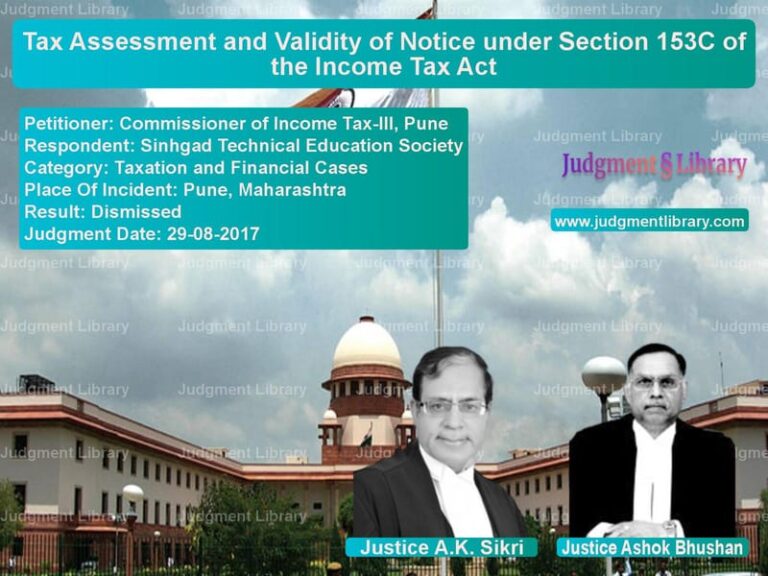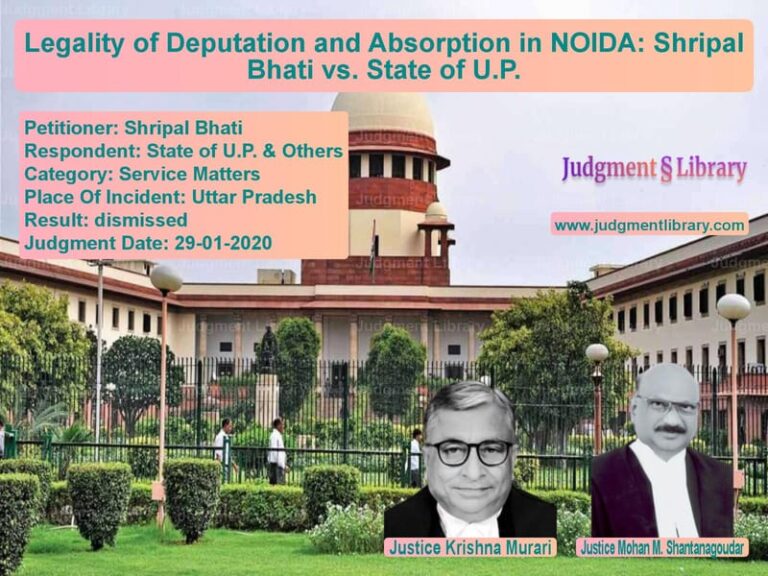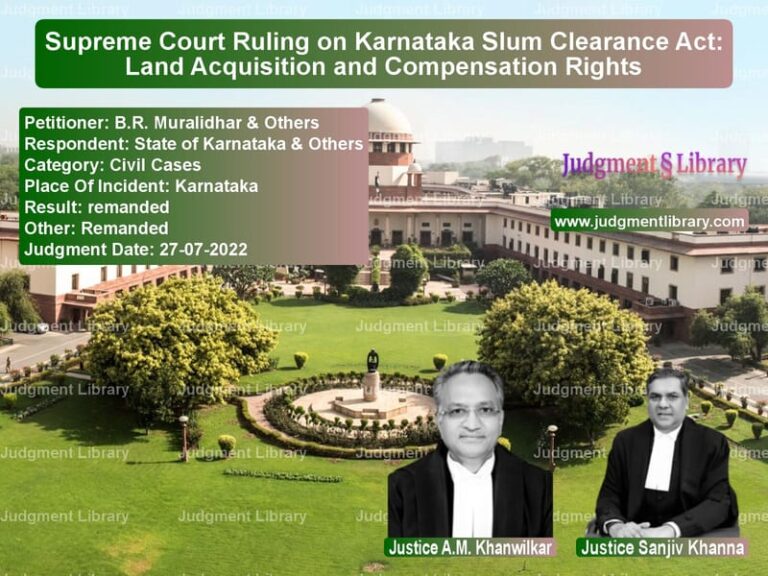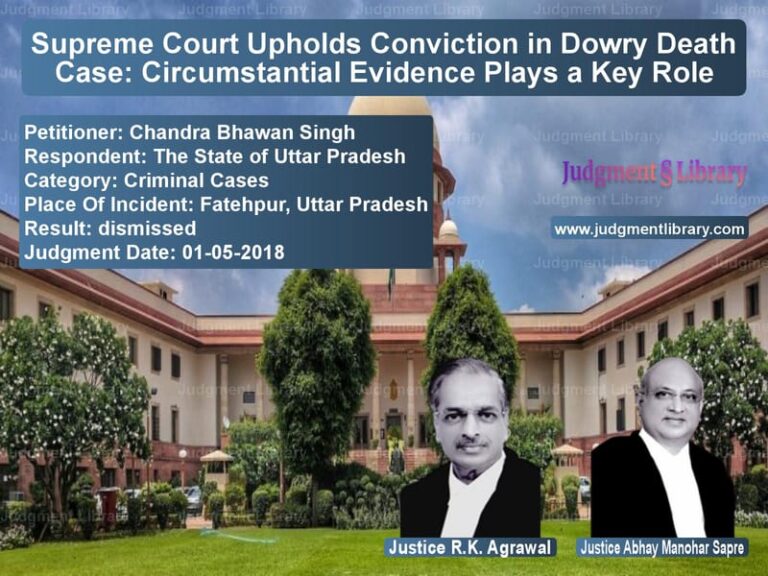Supreme Court Grants Indigent Status for Appeal in Motor Accident Compensation Case
The case of Alifiya Husenbhai Keshariya vs. Siddiq Ismail Sindhi & Ors. revolves around the issue of whether a claimant awarded compensation in a motor accident case can be denied the status of an indigent person while filing an appeal for enhanced compensation. The Supreme Court, in its judgment dated May 27, 2024, ruled in favor of the appellant and held that the mere award of compensation does not automatically disqualify a person from seeking indigent status if the amount has not yet been received. The judgment ensures access to justice for financially disadvantaged claimants.
Background of the Case
The appellant, Alifiya Husenbhai Keshariya, was injured in a road accident on July 4, 2010, while riding pillion on a bike, which was hit by a truck. As a result, she sustained severe injuries, was hospitalized for 14 days, and underwent plastic surgery. At the time of the accident, she was earning ₹3,000 per month, but after the accident, she suffered permanent disability and could no longer work.
She filed a claim for ₹10 lakh with 18% interest before the Motor Accident Claims Tribunal (MACT) in Jamnagar, Gujarat. The tribunal awarded her ₹2,41,745 with 9% interest on October 17, 2016. Dissatisfied with the amount, she approached the Gujarat High Court seeking enhanced compensation through a Regular First Appeal.
Read also: https://judgmentlibrary.com/supreme-court-orders-refund-of-stamp-duty-in-fraudulent-property-deal/
Legal Proceedings
Since she could not afford the court fees for filing the appeal, the appellant filed a Miscellaneous Civil Application in 2018, requesting permission to file the appeal as an indigent person. The Gujarat High Court dismissed her application on August 7, 2018, reasoning:
“The applicant-appellant cannot be considered an indigent person as she has been awarded compensation by the tribunal. She must pay the court fee first.”
The appellant argued that she had not yet received the compensation and, therefore, still qualified as an indigent person. However, the High Court did not entertain her plea, instead granting her eight weeks to deposit the court fees.
Aggrieved by this decision, she filed a special leave petition before the Supreme Court.
Arguments by the Petitioner (Alifiya Husenbhai Keshariya)
Senior Advocate Ms. Rana, representing the petitioner, argued:
- The Gujarat High Court’s decision was erroneous because the compensation awarded had not been received at the time of filing the appeal.
- The tribunal’s award was significantly lower than the amount claimed, and she had the right to seek enhanced compensation.
- Under Order XLIV of the Code of Civil Procedure (CPC), an indigent person must be allowed to file an appeal without court fees if they genuinely lack financial resources.
- The High Court failed to conduct a proper inquiry to determine her indigency status.
Arguments by the Respondents
The respondents contended:
- Since the tribunal had awarded compensation, the appellant was no longer indigent.
- The appeal could not be entertained unless the required court fee was paid.
- The High Court was correct in rejecting the application based on the compensation awarded.
Supreme Court’s Observations
1. The Right to Access Justice
The Supreme Court highlighted the importance of ensuring access to justice for financially disadvantaged litigants:
“The poor shall not be priced out of the justice market by insistence on court fees and refusal to apply the exemptive provisions of Order 33, CPC.”
2. Awarded Compensation Does Not Automatically Disqualify Indigent Status
The Court observed that the High Court erred in assuming that the mere award of compensation eliminated the appellant’s indigency. The judgment stated:
“The appellant’s application ought to have been considered properly. The mere fact that an award has been made does not mean she has received the compensation or is financially capable of paying the court fees.”
3. Indigent Status Must Be Determined Based on Real Financial Condition
The Supreme Court referred to its previous ruling in Mathai M. Paikeday v. C.K. Antony (2011), which laid down guidelines for determining indigency:
“A person is indigent if the payment of fees would deprive them of basic living expenses or if their financial condition substantially impairs access to legal remedies.”
4. Gujarat High Court Failed to Conduct Proper Inquiry
The Court criticized the High Court for failing to conduct an inquiry as mandated under Order XLIV, Rule 3(2) of CPC:
“The Appellate Court did not conduct any inquiry into the appellant’s indigency status, which was necessary to determine her eligibility for exemption from court fees.”
Key Findings and Judgment
The Supreme Court ruled in favor of the appellant, holding:
- The Gujarat High Court’s decision rejecting her indigent status was incorrect.
- She must be allowed to file the appeal as an indigent person.
- The appeal for enhanced compensation should proceed without the requirement to deposit court fees.
- The High Court must decide the appeal expeditiously within six months.
The Court ordered:
“The appeal is allowed. The appellant is permitted to file her appeal as an indigent person, and the Gujarat High Court shall hear and decide the case within six months.”
Implications of the Judgment
This ruling has significant implications:
- Ensuring Access to Justice: Indigent persons should not be denied the right to appeal due to financial constraints.
- Correct Application of Indigency Laws: Courts must conduct proper inquiries before rejecting indigency applications.
- Precedent for Motor Accident Compensation Cases: Claimants seeking enhanced compensation can now file appeals without court fees if they have not received the awarded amount.
- Speedy Disposal of Cases: The Supreme Court has urged high courts to dispose of such cases within a reasonable time frame.
Conclusion
The Supreme Court’s decision in Alifiya Husenbhai Keshariya vs. Siddiq Ismail Sindhi & Ors. reinforces the principle that financial hardship should not be a barrier to justice. By allowing the appellant to file her appeal as an indigent person, the Court has upheld the fundamental right to access the legal system without economic constraints. This judgment sets a strong precedent for similar cases, ensuring that victims of accidents can pursue rightful compensation without procedural hindrances.
Petitioner Name: Alifiya Husenbhai Keshariya.Respondent Name: Siddiq Ismail Sindhi & Ors..Judgment By: Justice J.K. Maheshwari, Justice Sanjay Karol.Place Of Incident: Jamnagar, Gujarat.Judgment Date: 27-05-2024.
Don’t miss out on the full details! Download the complete judgment in PDF format below and gain valuable insights instantly!
Download Judgment: alifiya-husenbhai-ke-vs-siddiq-ismail-sindhi-supreme-court-of-india-judgment-dated-27-05-2024.pdf
Directly Download Judgment: Directly download this Judgment
See all petitions in Damages and Compensation
See all petitions in Contract Disputes
See all petitions in Motor Vehicle Act
See all petitions in Road Accident Cases
See all petitions in Judgment by J.K. Maheshwari
See all petitions in Judgment by Sanjay Karol
See all petitions in allowed
See all petitions in Remanded
See all petitions in supreme court of India judgments May 2024
See all petitions in 2024 judgments
See all posts in Civil Cases Category
See all allowed petitions in Civil Cases Category
See all Dismissed petitions in Civil Cases Category
See all partially allowed petitions in Civil Cases Category







